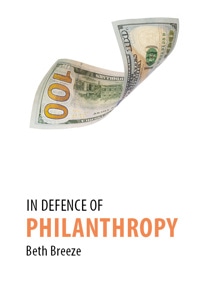Beacon’s Sarah Jane O’Neill considers why we should celebrate philanthropy if we want to encourage more of it.
In Defence of Philanthropy:
Challenging anti-philanthropy narratives.
Dr Beth Breeze OBE discusses why so many fundamental criticisms of philanthropy remain unchallenged in the UK today. She puts forward an argument for why we need to change the narrative around high-net-worth charitable giving.
My defence of philanthropy owes a debt to the Beacon Collaborative. The conversations I’ve had over the years with the people who founded and participate in Beacon have hugely helped to shape my thinking about the constructive role that philanthropy can play in society, and the damaging consequences that unconstructive – and often uninformed – critique can have.
Attacks on ‘big giving’ have become more commonplace over the last decade or so, and they are coming from at least three different directions:
- Academic Critiques, that view philanthropy as fundamentally undemocratic;
- Insider Critiques, that castigate givers for picking the “wrong” causes, and;
- Populist Critiques, that views all giving as a self-interested scam.
The essentials of these arguments are long-standing and contain some seeds of truth: donors are not elected, some giving is more effective than others, and mixed-motives are the norm. What’s new is the unprecedented scale and volume of these criticisms, their instant spread via moral grandstanding on social media, and the lack of any discernible counter-argument.
I understand why philanthropists themselves might hesitate to push back: who wants to hear from privileged people who feel misunderstood? But having worked as a fundraiser for a decade, and knowing how reliant many nonprofits are on donated income, it became clear to me that a defence of philanthropy was needed.
“I understand why philanthropists might hesitate to push back: who wants to hear from privileged people who feel misunderstood?”
We know that negative reinforcements decrease the likelihood of that action taking place (who will give if giving is seen as proof you’re a tax-dodging egotist?). So, if hyper-criticism of philanthropy risks curtailing donations then it urgently needs a response, because charities cannot run on goodwill alone.
Almost all of us benefit in some way from the work of organisations that need philanthropic gifts of all sizes to fund activity that benefits everyone, such as stronger communities, a cleaner environment, medical advances and new knowledge. Donations that funded vaccines and cures for COVID-19 benefited people of every wealth bracket, the same is true for philanthropic efforts to mitigate climate change.
But the highest price for a world with less philanthropy would be paid by those facing the toughest life circumstances, who fall through whatever public sector safety net exists where they live, who cannot purchase all their necessities in the market, and who are therefore most reliant on the kindness of strangers.
“But the highest price for a world with less philanthropy would be paid by those facing the toughest life circumstances.”
Exposing the unfair generalisations and over-statements in common critiques of philanthropy is, of course, not the same thing as defending every philanthropist and every philanthropic act. There remains a need to root out and expose poor philanthropic behaviour, and to gently help everyone to become more thoughtful and effective in their giving. But nuance is lacking in most critiques.
 One name (most often ‘Sackler’), or one word (such as ‘undemocratic’ or ‘tax-subsidised’) is usually enough for critics to feel they have “won” the argument, case dismissed. Yet in no other area of life do we generalise so easily from an extreme case: if we did, no one would visit a GP after Harold Shipman’s murderous acts, or trust any police officer after Wayne Couzens’ terrible crime.
One name (most often ‘Sackler’), or one word (such as ‘undemocratic’ or ‘tax-subsidised’) is usually enough for critics to feel they have “won” the argument, case dismissed. Yet in no other area of life do we generalise so easily from an extreme case: if we did, no one would visit a GP after Harold Shipman’s murderous acts, or trust any police officer after Wayne Couzens’ terrible crime.
Cleary there is more nuance in the academic critiques, yet ‘democracy’ amounts to more than representative democracy – that’s a very narrow way of conceiving how the public can contribute to the functioning of society: Vote then shut up!
Conceding that some good can, and has, come from private donations – including funding of campaigns to change the laws on slavery, suffrage and same-sex marriage – enables us to move away from the suggestion that philanthropy is a fundamentally illegitimate activity, to focus instead on its improvability. Things can always be done better, but it is a classic mistake to let perfection be the enemy of good, and the price of that mistake will be felt most acutely by those most reliant on private giving.
“‘Democracy’ amounts to more than representative democracy – that’s a very narrow way of conceiving how the public can contribute to the functioning of society.”
Simply noting that philanthropy can be a force for good – which seems unarguable if, for example, you are the parent of one of the millions of children whose life has been saved by philanthropic funding of vaccination programmes and disease eradication efforts – is to invite accusations of being a naïve apologist for the rich.
The fact that many rich donors share concerns about growing inequality, and are in favour of more progressive taxation, is conveniently ignored by those who use philanthropy as a lightning rod to channel all of their concerns about the state of the world today.
Wealthy non-givers are left in peace to indulge in conspicuous consumption or to hoard their wealth, whilst those who stick their head above the philanthropic parapet are shot down.
The field of philanthropy has become a dumping ground for generalised worries and performative posturing: “The world shouldn’t be like this…” is the rallying cry of critics. But it is! So what are we – collectively – going to do about it? Knocking the minority of the wealthy who are generous is an awful lot easier than doing the hard work of re-imagining and re-building social and economic structures.
“‘The world shouldn’t be like this…’ is the rallying cry of critics. But it is! So what are we – collectively – going to do about it?”
Contrary to populist expectations, there are many philanthropists on public record recognising that current structures are not serving society well. Examples of philanthropy invested in challenging the status quo include efforts to support grass-roots social justice organisations, to empower beneficiaries, to tackle inequality, and to expose and reverse class and racial privilege.
Examples of philanthropically-funded efforts to tackle structural economic challenges include the Omidyar Network’s $35 million initiative to ‘Reimagine Capitalism’ with a focus on advancing workers’ rights – a theme also present in MacKenzie Scott’s grant-making which featured a number of labour organisations.
The Ford Foundation’s prioritisation of funding social and racial justice includes alignment with the concept of ‘inclusive capitalism’ to create “an equitable, sustainable future… that works for everyone” according to the foundation’s president Darren Walker, this includes pushing corporations to look beyond shareholder returns to focus on the welfare of employees and local communities.
The belief that philanthropy only ever advances class interests is therefore clearly unfounded, as are many other elements of common critiques of philanthropy. Pointing out the lack of empirical evidence will not necessarily change the minds of those deeply attached to an anti-philanthropy view.
“Many people who are hearing and repeating critiques may well be receptive to a different perspective that acknowledges the improvability of philanthropy.”
As Ben Goldacre wrote in Bad Science: “You cannot reason people out of positions they didn’t reason themselves into”. But many people who are hearing and repeating critiques may well be receptive to a different perspective that acknowledges the improvability of philanthropy, highlights efforts to make private giving more ethical and effective, and explains the positive potential of philanthropy.
It is time to speak up and defend philanthropy.
About Beth Breeze
Beth worked as a fundraiser and charity manager for a decade before co-founding the Centre for Philanthropy at the University of Kent in 2008 where she now leads a team conducting research and teaching courses on philanthropy and fundraising, including an innovative MA Philanthropic Studies taught by distance learning.
She researched and wrote the annual Coutts Million Pound Donor Report from 2008-2017, co-authored Richer Lives: why rich people give (2013), The Logic of Charity: Great Expectations in Hard Times (2015) and co-edited The Philanthropy Reader (2016).
Her book The New Fundraisers: who organises generosity in contemporary society? won the AFP Skystone Research Partners book prize for 2018. Beth’s latest book (Sept 2021) is entitled In Defence of Philanthropy and is available here.


